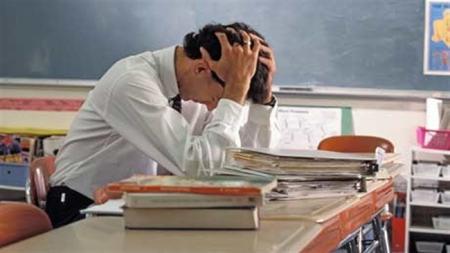
More than half of the educators point out their mental health is an issue: 58 percent said their mental health was ‘not good’ for seven or more of the previous 30 days. A similar survey in 2015 found just 34 percent of respondents felt the same, usatoday.com reported.
The findings are being released by the American Federation of Teachers and the Badass Teachers Association, a national grass-roots organization focused on social justice.
Randi Weingarten, president of the teachers' federation, said that over the past few years, teachers have actually swapped one kind of stress — an intense national focus on standardized skills tests — for another.
After President Obama signed the Every Student Succeeds Act in 2015, Weingarten said, many observers believed that educator stress would ease. "You would have expected the numbers to go down, not up,” she said.
But stress over the coarseness of our political debate, she said, has become a big dilemma for schools, she said.
“This notion that being coarse and tough and enabling hate is OK is highly, highly, highly disruptive and problematic in schools and goes completely against what parents and teachers know is absolutely important for kids, which is a safe and welcoming environment,” Weingarten said in an interview.
The survey of nearly 5,000 educators, most of them responding online, found that the vast majority — 86 percent — did not feel respected by Education Secretary Betsy DeVos, who has made expanding private — and charter-school choice a centerpiece of her career.
Weingarten said the negative findings on DeVos, a Michigan billionaire and Republican mega-donor who has championed school choice, are telling.
"People get what she’s doing — and she’s doing the same thing nationally as she tried to do in Michigan ... which is to completely disrupt public schooling, find ways to undermine it, defund it, destabilize it, at the same time actively promoting private alternatives, even though the private alternatives don’t have a good track record," she said.
Weingarten also criticized DeVos for not stepping in more forcefully, as past administrations have done, to help educators after recent natural and man-made disasters.
“That has never happened with this administration: Not after Charlottesville, not after the hurricanes, not after the fires, not after Las Vegas. It has never happened (with DeVos). Instead, she spends the time sitting with (Republican pollster) Frank Luntz trying to figure out how to sell vouchers.”
The Education Department did not immediately respond to a request for comment on the findings, which relied on a random sample of 830 members the teachers' federation as well as educators in two New York school districts. More than 4,000 other educators responded to a public version of the survey online.
The findings show that 61 percent of educators, as well as school staff, say their work ‘always’ or ‘often’ stressful.
They also don't appear to get much sleep: Only one in five (18 percent) get eight or more hours of sleep per night. The vast majority (78 percent) manage five to seven hours a night.
The new survey follows an unrelated one from UCLA last week that found 51.4 percent of teachers reported more students experiencing ‘high levels of stress and anxiety’ than in previous years.
